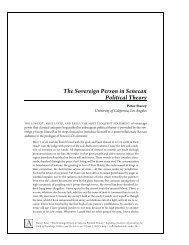Deceit, Desire, and the Literature Professor: Why Girardians Exist
Deceit, Desire, and the Literature Professor: Why Girardians Exist
Deceit, Desire, and the Literature Professor: Why Girardians Exist
Create successful ePaper yourself
Turn your PDF publications into a flip-book with our unique Google optimized e-Paper software.
LANDY | DECEIT, DESIRE, AND THE LITERATURE PROFESSOR: WHY GIRARDIANS EXIST 11<br />
<strong>the</strong>n, running around saying that “everything is water” to anyone who will listen. “Don’t be ridiculous,”<br />
you tell me, “not everything is water.” “All right,” I concede, “only some things are water<br />
(namely, <strong>the</strong> watery things); but isn’t that more modest observation an important one to<br />
bear in mind?”<br />
Image by Jacqueline Basu<br />
The problem with my “Some Things Are Water” campaign is not that <strong>the</strong> claim is false; it’s<br />
that everyone already knows it. (As a bumper sticker, it probably wouldn’t catch on.) And <strong>the</strong><br />
same is true for <strong>the</strong> (pardon <strong>the</strong> pun) watered-down version of Girardianism. Did we really need<br />
Girard to tell us that people sometimes desire things because o<strong>the</strong>r people do? <strong>Girardians</strong> may<br />
imagine that this is supposed to come as a shock to <strong>the</strong> rest of us. But why should it, when <strong>the</strong><br />
expression “keeping up with <strong>the</strong> Joneses” has been in common parlance for a hundred years? 36<br />
<strong>Why</strong> should it, when every god-awful sitcom at some point or o<strong>the</strong>r features Alice trying to get<br />
Bobby jealous by pretending to be in love with Charlie? 37 (And no, those sitcom writers were<br />
not secretly reading Girard: Alfred de Musset already used <strong>the</strong> device in 1834, <strong>and</strong> he was certainly<br />
not alone in doing so.) 38<br />
Again: why should <strong>the</strong> idea of borrowed desires be news to us, when La Rochefoucauld was<br />
talking about <strong>the</strong>m in <strong>the</strong> seventeenth century? 39 <strong>Why</strong> should it, when Stendhal’s The Red <strong>and</strong><br />
36 The first installment of <strong>the</strong> comic strip “Keeping up with <strong>the</strong> Joneses” saw <strong>the</strong> light of day in 1913.<br />
37 Here is a list I managed to assemble in about fifteen minutes: Saved by <strong>the</strong> Bell: The New Class, episode 63, “The<br />
Fallout,” December 2, 1995; Full House, episode 43, “Luck Be a Lady (1),” February 21, 1989; Buffy <strong>the</strong> Vampire<br />
Slayer, season 3, episode 9, “The Wish,” December 8, 1998; Frasier, season 11, episode 6, “I'm Listening,” October 28,<br />
2003; The Big Bang Theory, season 2, episode 2, “The Codpiece Topology,” September 29, 2008. I am sure <strong>the</strong>re are<br />
plenty more where those came from.<br />
38 Alfred de Musset, On ne badine pas avec l’amour (Paris: Gallimard, 2010), act 3, scene 3. Charlotte Brontë uses <strong>the</strong><br />
same device in Jane Eyre (1847): “I feigned courtship of Miss Ingram,” says Rochester, “because I wished to render<br />
you as madly in love with me as I was with you” (Jane Eyre [Cambridge: Cambridge University Press, 1996], 282).<br />
39 “Rien n’est si contagieux que l’exemple” (Maxime 230); “il y a des gens qui n’auraient jamais été amoureux s’ils<br />
n’avaient jamais entendu parler de l’amour” (Maxime 136). As Pommier notes (René Girard, 42), Girard never<br />
mentions La Rochefoucauld.



